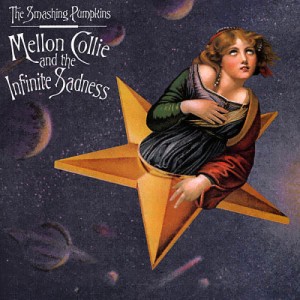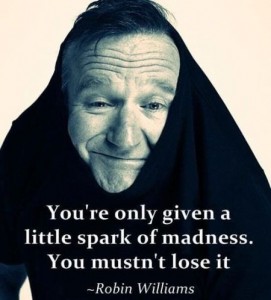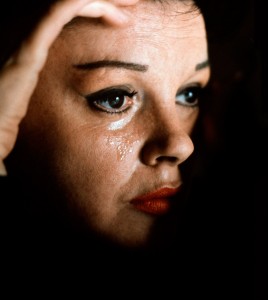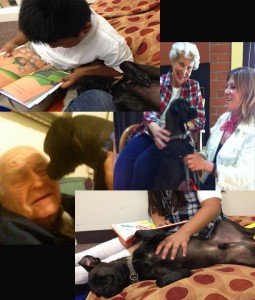Melancholy and the Infinite Void Left
The reality has set in. Even if we’ve not fully recovered from the shock of Robin William’s suicide, we’ve accepted it. And in its immediate wake, there is much talk of depression (though I believe bipolar disorder would be more accurate, in his case), and the need for the depressed to “reach out” and “get help.” What exactly that means, I’ll address later.
I’ve not been diagnosed with depression, or bipolar disorder for that matter. And I don’t believe I suffer from either in that way you hear of people being crippled mentally, emotionally, and spiritually, for months or years on end. What I suffer from is extreme sensitivity. Not in a thin-skinned way; far from it. More like a heightened sense of empathy and compassion. I’ve understood loss since I was very young, before I even knew what true loss was. The songs on the radio that had to do with loss — with pining for something you could not or could no longer have – I got those songs, connected with those artists. Songs like “Puff The Magic Dragon,” (hold the snarky “Dude, it’s about weed” comments – this song is ONLY about Puff being abandoned as far as I’m concerned, do not speak to me of alternative interpretations); and “Layla”, which frankly doesn’t even need lyrics — the guitar-driven, impassioned plea of the first half, and the piano-lead, liberated surrender of the second half, make you feel Clapton’s pain even more than you hear it in the lyrics, if that’s possible. And we know from the man himself that Clapton suffered the addiction that often accompanies depression and bipolar disorder.
Everyone assumes Robin William’s suicide was driven by depression (combined with a history of addiction, the two often come as a package deal; see Eric Clapton, above). And according to all accounts, he was guaranteed, certified, diagnosed depressed.
 No other mental disorder is romanticized like depression is. The blues, sorrow, melancholia, sadness, woe. Picture the tortured artist, alone but for their pain and suffering often serving as muse. Honestly, if Van Gogh were happy, he’d be making love in fields of sunflowers, not painting them in the saturated sunlight of his imagination. Ian Curtis would have been partying at clubs, not holed up alone in his room writing the songs that would make others dance to them. And, perhaps, Robin Williams would still be here.
No other mental disorder is romanticized like depression is. The blues, sorrow, melancholia, sadness, woe. Picture the tortured artist, alone but for their pain and suffering often serving as muse. Honestly, if Van Gogh were happy, he’d be making love in fields of sunflowers, not painting them in the saturated sunlight of his imagination. Ian Curtis would have been partying at clubs, not holed up alone in his room writing the songs that would make others dance to them. And, perhaps, Robin Williams would still be here.
I suspect it’s a wee more complicated that that. I suspect what makes great artists great is not their depression, blues, sorrow, melancholia, sadness, or woe; but rather, their extreme sensitivity – which I can relate to. Compassion and empathy cranked up to 11. But when joy and sadness go up to 11, that’s getting into bipolar disorder territory. Contrast the euphoria felt when someone tells you they’ve truly been touched by your play, song, book (or tens of thousands have applauded your performance), to the devastation of knowing (rightly or wrongly) that you’ll never be able to achieve that again, a fear many performers who’ve known tremendous success face regularly. Robin Williams’ latest TV show, “The Crazy Ones,” was recently cancelled. Just sayin’.
It’s that sensitivity that makes them great artists. Their emotions are never far from the surface, always accessible. Great for an artist at work, but difficult and painful on a daily basis, when navigating day-to-day life. There are pills that kill the pain… and kill the spark. Not an option when your work is better, is in greater demand, because of the spark. Williams himself spoke of the spark. He knew all too well the importance of the spark.
It was especially heart and gut wrenching to watch this video (of Yazidis in Iraq being rescued from ISIS) juxtaposed with the breaking coverage of William’s suicide (which is when CNN aired it). These people have lost it all — homes, loved ones, identities, country, belongings; everything they’ve ever worked for — yet they desperately want nothing but to live. Then there’s Robin Williams, who truly had it all — admiration from his peers, awards for his achievements, money, the privilege of working with amazing people in a career where he’s touched so many lives, family — yet he desperately wanted nothing but to die. Or at the very least, to stop hurting. Most people can’t imagine that kind of hurt, from one so blessed; or so it appeared.
But that’s just it: I know that when I feel myself slipping into darkness, seeing images of people like these Yazidis — fighting desperately for life, despite so much loss and suffering — actually makes me feel worse about myself; how pathetic am I that I can’t appreciate all the good things I have and have had (which doesn’t even come near the career success or fortune that Williams enjoyed)?
Sometimes it’s just having that one little reason that you must stay here, that one little thing to get you through the moment. Like taking care of my rescue pup Picard, so I can continue to share him with the folks at the hospice center he lights up during our weekly Animal Assisted Therapy visit, and the children who read to him through the SPCA Puppy Dog Tales program. Eventually you come around, and realize the storm is subsiding, the pain is passing. Sadly, Robin wasn’t able to find that one little reason, that one little thing in that crucial, fateful moment. I’ll never know, I wasn’t there. But that’s what I imagine might have happened.
I wasn’t a fan of William’s standup routine, or when he was a guest on a talk show. Sure, he was a genius. No one even came close to his brilliance at improv. But it gave me a headache, like the one and only time I ever took speed my freshman year at college, studying for finals. More like a steady, fast headthump than a headache.
But, those parts Williams played so convincingly in “Dead Poet’s Society” and “Good Will Hunting” — I loved him in those roles. The protector; a calm, stable figure that gives reassurance and hope, who makes us smile a little when we need it most – it’s as if he played those parts so well because that’s what he himself needed most in his life, for those people to exist. We all need for those people to exist. Whenever I need one, I know where I can forever find one. O captain, my captain.
As promised, back to “reaching out” and “getting help”:
My friend Rick went to a funeral on the day Robin Williams committed suicide, the funeral of a friend of his who had also committed suicide. Rick learned, too late, that his friend suffered from depression. Initially Rick was sad and felt guilty, that he didn’t know about his friend’s condition. Then he was angry, that his friend didn’t reach out.
“Do you think you could have saved him?”
We’ll never know.
My friend Matt posted this on Facebook, later that same week:
Lately I’ve had a powerful sense of impending doom.
Frankly, a lot of the recent news hasn’t helped.
A friend & teacher lies in a coma.
Dad’s 88 and forgetting more & more, eating less & less.
And all those famous folks who meant quite a bit to me dying pulls at my reserves too.
I’m gonna have some coffee now
And I though that was cool of him, to “reach out, ” in his own way. But then one of his friends commented this:
Hugs. Try to spend some time in the sun today.
Hugs. Time in the sun.
If someone gave me that advice when I’m down, I would know they meant well, and for that reason alone my only response would be, “Thank you.” But in terms of effectiveness, they might as well tell me to dance with fucking unicorns on fucking rainbows. Because anyone who knows me knows I’m not a unicorns and rainbows kinda gal.
But that’s just me.
How one finds their way to effectively (very important qualifier there) reach out and get help is as personal as our fingerprints. Knowing yourself and what works for you – and, most importantly, sharing that information with others – is key. Because what works for some might have the completely opposite effect on others. Hugs. Try to spend some time in the sun today. Fuck you.
Here’s what I suggest:
Find what works for you, something you KNOW makes you smile a little. A panda video. A goat video. Your favorite Robin William’s movie. Maybe a unicorn dancing on a rainbow video. Be specific. Then, tell all your friends. I mean, really put it out there. Especially tell your friends who make you smile a little just by being themselves. I’m not suggesting this as a cure. Rather… just something to get you through that really, really dark moment. You know the one.
As for me: If I ever reach out, please do NOT wish me social media hugs, or tell me to spend some time in the sun today. Here’s why: Because seeing shiny happy people get off just by being in the sun makes me feel completely impotent that I can’t get it up and be grateful for the blessing of that miracle that is the sunny day. Which makes me feel shittier. Maybe you agree. Maybe getting some sun works for you, and that’s great. But for me, just hearing those words, in that state, makes me cringe.
Instead, quote me some Blazing Saddles or early SNL sketches, or really bad ’70’s song lyrics. That usually helps a little.
A final word on Robin Williams.
By all accounts, he was that rare celebrity who, when people encountered him, went out of his way to make sure they were okay, easing their pain or fear, or just making sure they had a reason to smile that day. Because he understood, perhaps too well, pain and fear – and the importance of having a reason to smile.
May you be smiling now, Mr. Williams. And thank you for the smiles, so many smiles, that you gave.





